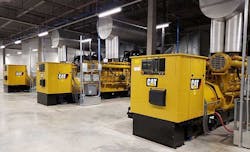A Day in the Life of a Colocation Data Center Operator
Ryan Beebout, General Manager for Sabey Data Centers, Central Washington, walks through the day-to-day tasks and routine of a colocation data center operator.
Ryan Beebout, General Manager for Sabey Data Centers, Central Washington
We begin each morning shift at Sabey’s Central Washington facilities with a “standup meeting.”
Our operations crew forms a circle in the main office, which is sufficiently removed from the swirl of electrical and mechanical clamor that fill the data hall. One by one, each team member lists the top three things they’ll work on that day. It’s a chance to ask questions, provide updates on projects, and get on the same page before everyone disperses into the data center for the 12-hour duration of their shift. This scrum session is the most, and perhaps the only, predictable part of a data center operator’s schedule.
Every day is different! We might be doing maintenance on a mechanical system one day and commissioning a data center hall the next, and it is this operational unpredictability that necessitates colocation data centers.
Sure, there’s the capital expenditure element—it’s more cost-effective to lease facility space already equipped with power, cooling, security and connectivity infrastructure than it is to build one. But even then, our operations team needs to be staffed around the clock to manage this infrastructure, perform maintenance and troubleshoot the IT load when something goes wrong.
That’s why, behind the scenes of every colocation data center, there are people like our operators who handle those many and ever-changing day-to-day functions to deliver predictable, reliable service. For the price of their tenancy, businesses don’t just get space, power and cooling—they also get the expertise, attention and dedication of highly-skilled and well-trained data center operators. And it’s this more than anything, that gives businesses in finance, healthcare, e-commerce and other industries the freedom to focus on their core competencies.
A peek behind the curtain
These days, I spend much of my time in my office, helping coordinate the many functions of the data center. But I got my start as a shift engineer, and there are two sides to that job:
- Facilities: These experts focus on maintaining electrical, mechanical and cooling infrastructure that keeps servers running.
- Remote Hands: Also known as “smart hands,” this team focuses on many tasks which might be done by IT teams in enterprise data centers, such as installing server hardware, running cables and providing other remote support for tenants.
A lot of our customers are remote, and they don’t necessarily want to have to get on a plane and come out here every time there’s a problem, so a lot of the IT support work is done in-house by us.
Most clients will remotely monitor their hardware and, upon detecting an issue, contact us via an online customer portal. A remote hands technician is then dispatched to address the issue. They can do much of the work by themselves: rebooting a device, replacing a failed power supply, swapping out a hard drive, racking equipment into cabinets, etc. But remote hands team members always carry a smartphone and a special headset that can filter out the facility’s noise so they can communicate with the client in real time and even stream video if needed.
Twice a week, our data center operators will also participate in mandatory training sessions to keep them sharp. Other than the daily standup meeting, these sessions are perhaps the most consistent part of a colocation data center operator’s schedule.
In non-troubleshooting situations, remote hands technicians might need to replace an old device for the customer, which means they need to carefully track outgoing and incoming shipments. New equipment is stored in highly secure areas where boxes are until they get instructions from the customer to install it. Every single piece of equipment, including both ends of every cable, is labeled.
Another task that may involve remote hands technicians is installing cabinets for new customers or those expanding their footprint. In many cases, we source the materials for these cabinets on our client’s behalf, soliciting the best value for the customer, putting together a proposal, and then building out the addition.
On the facilities side, shift engineers provide remote support in a very different way. They might spend any given day:
- Running backup generators once a month under an artificial load to ensure that they are in good shape. Utility outages are rare, but we make sure our backup systems are ready just in case.
- Maintaining cooling equipment.
- Oh-so-much more.
As for myself and my fellow managers, each week we’ll analyze maintenance tickets and decide to approve or delay them as part of our change management process. We’ll also create a maintenance calendar for techs that help them map out tasks. So while technically no two days might be the same, part of my current job is to bring as much order to operations as possible.
Everyone in the data center, from facilities and IT to supervisors to third-party contractors, is subject to rigid work controls. This helps ensure that no maintenance occurs that could potentially influence customer equipment without having first been documented, approved and brought to the attention of the customer.
Twice a week, our data center operators will also participate in mandatory training sessions to keep them sharp. Other than the daily standup meeting, these sessions are perhaps the most consistent part of a colocation data center operator’s schedule.
Just another day in the life
It’s safe to say that modern commerce is tremendously dependent on data centers, and I know this as well as anyone. I’ve worked with clients in financial services, healthcare, air travel, consumer applications and even film and entertainment—one of our tenants makes CGI movies, and uses our data center to house its render farm.
In every case, these servers are critical to the business or organization. If they were to go down, it would be bad, and even potentially disastrous for them.
Yet, for myself and my team of operators—who are nearest and most attentive to this mission-critical equipment—maintaining these facilities is just another day in our lives as colocation data center operators.
And that, more than anything else, puts the importance of my expert team, and the work we do at Sabey Data Centers every single day, into perspective.
Ryan Beebout is General Manager for Sabey Data Centers, Central Washington. Beebout has been working in critical environments for more than fifteen years and thrives in the strict, process-driven environment of data center operations. Before joining joined Sabey in 2011, he served six years in the U.S. Navy operating the nuclear power plant on an aircraft carrier, where he scheduled and supervised reactor plant maintenance and operations.





